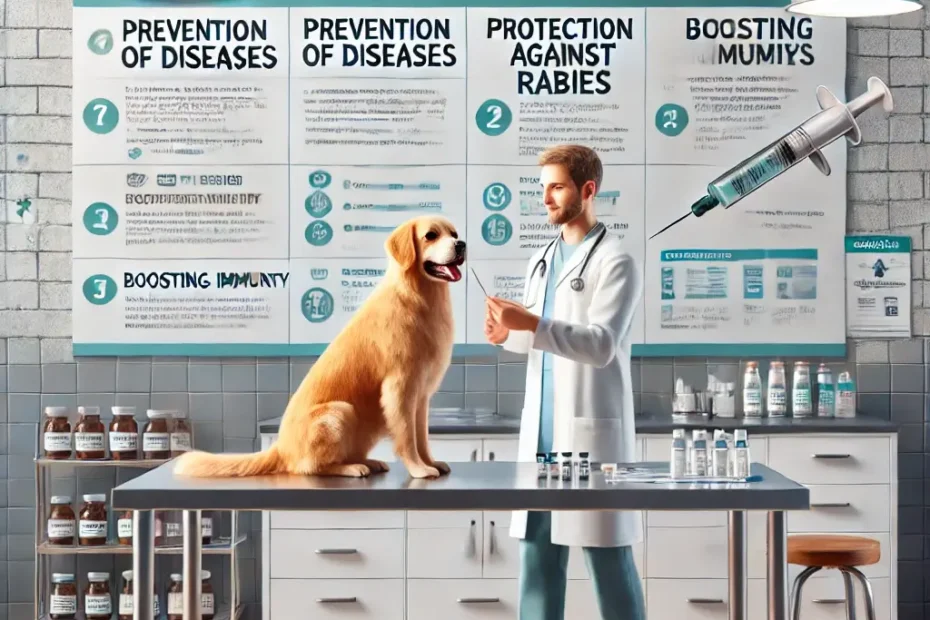Why Vaccinations for Dogs? Vaccinations are vital. They protect your dog from preventable diseases. Rabies, distemper, and parvovirus can kill dogs. They cause severe illness. Vaccines help your dog’s immune system fight diseases before they cause harm.
A proper vaccination schedule for dogs ensures timely immunity. Core vaccines, like rabies and distemper, are vital for all dogs. Most areas require them by law. You may need optional vaccines, like those for Bordetella and Lyme disease. It depends on your dog’s environment and lifestyle.
Many dog owners worry about the costs of vaccinations. Local organizations and clinics offer options. They include low-cost dog vaccinations and free pet vaccinations nearby. These services can care for your pet without financial strain.
Also Read
- Immune System Preventive Care Programs for Optimal Health and Wellness Solutions
- Personalized Preventive Care Plans for Optimal Health and Wellness Solutions
- Preventive Health Screening Packages for Women: Accurate Home Test Kits
- Early Disease Detection Health Checks: Essential At-Home Colon Cancer Tests
In this guide, we’ll explore everything you need to know about vaccinating your dog. We’ll answer your questions about dog vaccinations. This includes their costs and identifies which ones they need for grooming. Let’s dive in and ensure your furry friend stays healthy and protected.
Core Vaccines for Dogs: A Guide to Essential Protection

Vaccinating your dog is a critical step in ensuring its health and longevity. All dogs need core vaccines. They are essential, no matter the breed, age, or location. These vaccines guard against diseases that are highly contagious and deadly. Some are transmissible to humans. Knowing which vaccines your dog needs and when to give them is key to responsible pet ownership.
What Are Core Vaccines?
Core vaccines are those every dog must receive. They protect against widespread, severe diseases. These vaccines are recommended by veterinary health authorities like the American Veterinary Medical Association (AVMA) and are often required by law.
Core Vaccines for Dogs Include:
- Rabies Vaccine:
- Why It’s Important: Rabies is a fatal virus that affects the central nervous system and can be transmitted to humans.
- Schedule: Administered at 12–16 weeks of age, with boosters required annually or every three years depending on local laws.
- Canine Distemper Vaccine:
- Why It’s Important: This virus attacks the respiratory, gastrointestinal, and nervous systems of dogs.
- Schedule: Included in the DHPP vaccine, given as early as 6 weeks, with follow-up boosters.
- Canine Parvovirus Vaccine:
- Why It’s Important: Parvovirus causes severe vomiting, diarrhea, and dehydration, often fatal if untreated.
- Schedule: Part of the DHPP vaccine series, beginning at 6–8 weeks.
- Canine Adenovirus (Hepatitis) Vaccine:
- Why It’s Important: Protects against infectious canine hepatitis, which can cause liver and respiratory issues.
- Schedule: Included in the DHPP vaccine, with a similar schedule as distemper and parvovirus.
Vaccination Schedule for Core Vaccines
| Age of Dog | Core Vaccines | Frequency |
|---|---|---|
| 6–8 Weeks | DHPP (Distemper, Parvovirus, Hepatitis) | Initial dose |
| 10–12 Weeks | DHPP Booster | Booster dose |
| 12–16 Weeks | Rabies | Initial dose |
| Adult (Annually) | DHPP, Rabies | Annual booster (or as required) |
Benefits of Core Vaccines
- Disease Prevention: Vaccines protect dogs from parvovirus and distemper. These illnesses are costly to treat and often fatal.
- Legal Compliance: In most regions, the rabies vaccine for dogs is legally required, protecting both public health and your dog’s safety.
- Improved Quality of Life: A vaccinated dog is less likely to contract illnesses that diminish their quality of life and longevity.
Common Concerns About Core Vaccines
- Are Vaccines Safe? Yes, vaccines undergo rigorous testing to ensure safety and efficacy. Side effects are usually mild, such as soreness or lethargy.
- Can Core Vaccines Be Avoided? Skipping core vaccines puts your dog at risk of life-threatening diseases. Always consult a veterinarian to tailor a vaccination plan.
Cost of Core Vaccines
The cost of core vaccines varies depending on your location and provider.
- Rabies Vaccine: $15–$30 per dose.
- DHPP Series: $20–$50 per dose.
For cheap options, check community clinics or mobile units for low-cost dog vaccinations. Programs offering free pet vaccinations near me for dogs can also help reduce costs.
Resources for Affordable Vaccinations
- AppSumo: Find discounts on pet health services.
- Amazon: Shop for pet health essentials and aftercare supplies.
- AliExpress: Browse affordable pet products.
References
- “Vaccination Guidelines for Dogs,” American Veterinary Medical Association (AVMA).
- “Understanding Core Vaccines,” PetMD.
- “Affordable Pet Vaccination Options,” Humane Society of the United States.
Non-Core Vaccines for Dogs: Tailored Protection for Unique Needs
Not all dogs have the same risk of exposure to diseases, which is why non-core vaccines exist. These vaccines target specific environments or lifestyles. We give them based on your dog’s needs. Non-core vaccines are not mandatory. But, they protect dogs at risk of certain pathogens.
What are non-core vaccines?
Non-core vaccines are optional. A dog’s risk determines the administration of these vaccines. These vaccines target diseases that are rare but common in some areas. For example, dogs that board, live in tick-prone areas, or spend time outdoors may need non-core vaccines.
Key Non-Core Vaccines for Dogs
- Bordetella Bronchiseptica Vaccine:
- Why It’s Important: Bordetella is a leading cause of kennel cough, a contagious respiratory illness common in dogs in group settings.
- Schedule: Typically administered annually or biannually, based on exposure.
- Leptospirosis Vaccine:
- Why It’s Important: It protects against a bacterial infection. It spreads through contaminated water or soil, posing risks to dogs and humans.
- Schedule: Administered annually, especially in high-risk areas.
- Lyme Disease Vaccine:
- Why It’s Important: Provides protection against a tick-borne disease that can cause joint pain, fever, and kidney problems.
- We recommend annual vaccination for dogs in tick-infested regions.
- Canine Influenza Vaccine:
- Why It’s Important: It prevents two strains of canine flu (H3N2 and H3N8). They spread in places like doggy daycare and grooming salons.
- Schedule: Two doses initially, followed by annual boosters.
Who Needs Non-Core Vaccines?
Not all dogs require non-core vaccines. Veterinarians recommend these based on several factors:
- Lifestyle: Dogs that visit dog parks, kennels, or grooming salons are at greater risk of diseases like Bordetella and canine flu.
- Geography: Dogs living in regions with ticks or stagnant water may need Lyme disease and leptospirosis vaccines.
- Activities: Dogs that hike or hunt outdoors are more prone to ticks and other hazards.
Visual Guide: Core vs. Non-Core Vaccines
| Type of Vaccine | Core Vaccines | Non-Core Vaccines |
|---|---|---|
| Purpose | Essential for all dogs | Based on lifestyle and location |
| Examples | Rabies, DHPP | Bordetella, Leptospirosis |
| Frequency | Routine schedule | As recommended by the vet |
Pros and Cons of Non-Core Vaccines
Pros:
- Provides tailored protection against diseases relevant to your dog’s environment.
- Prevents costly treatment for avoidable illnesses.
- Reduces risks in multi-dog settings (like kennels).
Cons:
- May not be necessary for dogs in low-risk environments.
- Extra costs compared to core vaccines.
- There are mild side effects, such as lethargy or swelling at the injection site.
Cost of Non-Core Vaccines
The cost of non-core vaccines varies, with a typical range between $20 and $50 per dose. Many providers offer low-cost vaccinations for dogs through clinics and community events. Some programs offer free mobile dog vaccinations in underserved areas.
Tips for Managing Non-Core Vaccinations
- Consult a Veterinarian: Discuss your dog’s lifestyle and risks to determine if non-core vaccines are necessary.
- Set Reminders: Keep track of vaccination schedules using a pet health app or a calendar.
- Consider Titer Testing: For dogs with limited exposure, this test can measure immunity. It can reduce unnecessary vaccinations.
Helpful Resources for Vaccination Supplies
- Amazon: Shop for aftercare supplies, such as calming treats and topical solutions.
- AppSumo: Find deals on pet health trackers and wellness tools.
- AliExpress: Browse affordable dog care essentials and grooming products.
References
- “Non-Core Vaccines for Dogs,” American Veterinary Medical Association (AVMA).
- “Vaccination Recommendations,” Veterinary Centers of America (VCA).
- “Protecting Against Canine Influenza,” Centers for Disease Control and Prevention (CDC).
Puppy Vaccination Schedule: Protecting Your Pup Early
Vaccinating your puppy is one of the most important steps in ensuring it grows into a healthy adult dog. Puppies are vulnerable to diseases. Their immune systems are still developing. So, timely vaccinations are critical. A proper puppy vaccination schedule protects your pet from distemper, parvovirus, and rabies. It ensures that it has a strong start in life.
Why Vaccinations Are Essential for Puppies
Puppies get some immunity from their mother’s milk. But this protection is temporary. As maternal antibodies wane, vaccines step in to protect your puppy. Diseases like parvovirus and distemper are highly contagious. They can be fatal if not prevented. A vaccination schedule helps build your puppy’s immunity in these critical early months.
Recommended Puppy Vaccination Schedule
The following table outlines a typical puppy vaccination timeline based on veterinary recommendations:
| Age | Core Vaccines | Optional Vaccines |
|---|---|---|
| 6–8 Weeks | DHPP (Distemper, Hepatitis, Parvovirus) | Bordetella (Kennel Cough) |
| 10–12 Weeks | DHPP Booster | Leptospirosis, Lyme Disease |
| 12–16 Weeks | Rabies, DHPP Booster | Canine Influenza |
| 6 Months to 1 Year | DHPP Booster | Bordetella, Leptospirosis |
| Annually | DHPP, Rabies | Optional boosters based on lifestyle |
Core and Optional Vaccines
Core Vaccines
Core vaccines are essential for all puppies, regardless of their environment or lifestyle:
- Rabies Vaccine:
- Prevents a fatal disease that is transmissible to humans.
- Required by law in most regions.
- DHPP Vaccine:
- Protects against distemper, adenovirus, parainfluenza, and parvovirus.
- Administered in a series of doses.
Optional Vaccines
Optional vaccines are based on the puppy’s environment and risk of exposure:
- Bordetella Vaccine:
- This product protects against kennel cough, which is common in dogs in group settings.
- Leptospirosis Vaccine:
- Recommended for dogs in areas with standing water or wildlife.
- Lyme Disease Vaccine:
- Ideal for dogs in tick-heavy regions.
- Canine Influenza Vaccine:
- It protects against respiratory illnesses that are common in daycare and boarding environments.
Costs of Puppy Vaccinations
The cost of vaccinating a puppy varies depending on the clinic and region. On average:
- Core vaccines: $20–$50 per dose.
- Optional vaccines: $25–$60 per dose.
- Rabies vaccine: $15–$30 per dose.
For low-cost options, check local shelters or nonprofits for cheap, free dog vaccinations. Mobile services like free dog vaccinations near me can cut costs.
Tips for a Stress-Free Vaccination Experience
- Prepare Your Puppy: Bring its favorite toy or blanket to comfort it during the visit.
- Schedule strategically: Avoid scheduling vaccinations right before strenuous activities, like training or socialization classes.
- Monitor after vaccination: Mild side effects, like fatigue or swelling at the injection site, are normal. They should resolve within 24 to 48 hours.
Helpful Resources for Puppy Care Supplies
- Amazon: Shop for puppy essentials like leashes, toys, and calming treats.
- AppSumo: Explore discounts on pet wellness tools.
- AliExpress: Find affordable products for puppy care and training.
References
- “Vaccination Recommendations for Puppies,” American Veterinary Medical Association (AVMA).
- “Core and Non-Core Vaccines for Dogs,” Veterinary Centers of America (VCA).
- “Affordable Vaccination Options,” Humane Society of the United States.
Adult Dog Vaccination Schedule: Maintaining Lifelong Immunity
Vaccinations don’t stop once your dog reaches adulthood. A proper vaccination schedule is essential for adult dogs. It maintains immunity against diseases like rabies, parvovirus, and distemper. Boosters, custom vaccines, and check-ups keep your dog healthy for life.
Why Vaccinations Are Important for Adult Dogs
As dogs age, their immunity may decline. This is especially true if they miss their booster shots. Core vaccines, like the rabies vaccine for dogs, are vital for their health. They are also required by law in most areas. Diseases like leptospirosis and Lyme disease still threaten dogs in high-risk areas.
By staying consistent with vaccinations, you:
- Protect your dog from severe illnesses.
- Avoid costly treatments for preventable diseases.
- Meet legal requirements for vaccines, such as rabies.
Recommended Vaccination Schedule for Adult Dogs
| Age | Core Vaccines | Optional Vaccines |
|---|---|---|
| 1 Year | DHPP Booster, Rabies | Bordetella, Leptospirosis |
| 2–3 Years | Rabies (if triennial), DHPP | Lyme Disease |
| Annually | DHPP, Rabies (if annual booster) | Canine Influenza |
| Every 3 Years | Rabies, DHPP (depending on protocol) | Optional based on risk exposure |
Core and Optional Vaccines for Adult Dogs
Core Vaccines
Core vaccines remain essential throughout your dog’s life.
- Rabies Vaccine:
- It is required by law. It protects against a deadly infectious disease.
- DHPP Vaccine:
- Combines protection against distemper, hepatitis, parainfluenza, and parvovirus.
Optional Vaccines
Optional vaccines depend on your dog’s lifestyle.
- Leptospirosis Vaccine:
- Recommended for dogs exposed to standing water or to wildlife.
- Bordetella Vaccine:
- This product protects against kennel cough. It’s a must for dogs in daycare or boarding.
- Lyme Disease Vaccine:
- It prevents tick-borne illness in high-risk areas.
- Canine Influenza Vaccine:
- This is necessary for dogs in communal settings, like grooming salons or shows.
Titer Testing: An Alternative to Boosters?
Titer testing checks your dog’s antibody levels. It determines if they still have immunity from past vaccinations. This option may reduce the need for frequent boosters, especially for older dogs. But consult your vet before using titer tests instead of boosters.
Pros and Cons of Vaccinating Adult Dogs
Pros:
- Protects against preventable diseases.
- Maintains legal compliance for required vaccines.
- Ensures a healthy and active lifestyle.
Cons:
- Some vaccines may cause mild side effects, such as lethargy or swelling.
- Optional vaccines may not be necessary for low-risk dogs.
Cost of Vaccinating Adult Dogs
The cost of vaccinations varies depending on the provider and region.
- Core vaccines (DHPP, Rabies): $20–$50 per dose.
- Optional vaccines (Bordetella, Lyme): $25–$60 per dose.
To save money, search for low-cost dog vaccinations near me. Or, look for free pet vaccination programs for dogs near me. Mobile clinics and community events often provide affordable or complimentary services.
Helpful Resources for Vaccinations and Supplies
- Amazon: Find pet health supplies, including flea and tick prevention products.
- AppSumo: Explore deals on pet health trackers and vaccination reminders.
- AliExpress: Shop for affordable dog care products and accessories.
References
- “Adult Dog Vaccination Guidelines,” American Veterinary Medical Association (AVMA).
- “Titer Testing vs. Boosters,” PetMD.
- “Affordable Vaccination Clinics,” Humane Society of the United States.
Risks and Side Effects of Dog Vaccinations: What to Know

Vaccinations are vital for protecting dogs from deadly diseases. But, like any medical procedure, they can have risks and side effects. Knowing these risks helps you make informed decisions. It ensures you can care for your dog if it has any reactions.
Common Side Effects of Dog Vaccinations
Most dogs tolerate vaccines well, but some may experience mild side effects. These reactions are usually short-lived and resolve on their own within 24 to 48 hours.
Typical side effects include:
- Lethargy and mild fever:
- Dogs may feel tired or sluggish as their immune system responds to the vaccine.
- Swelling or soreness at the injection site:
- A small lump or tenderness might develop where the vaccine was administered.
- Decreased Appetite:
- Some dogs may eat less for a day or two after vaccination.
Management:
- Provide a comfortable resting spot for your dog.
- Offer your favorite treats or meals to encourage eating.
- Monitor the injection site for any changes.
Rare and Severe Reactions to Vaccines
Severe reactions are uncommon, but they can happen. Being aware of these possibilities ensures you can act quickly if needed.
Severe side effects include:
- Allergic Reactions:
- Symptoms: vomiting, diarrhea, swelling around the face, and difficulty breathing.
- Occurs within minutes to hours after vaccination.
- Anaphylaxis:
- A life-threatening reaction requires immediate veterinary attention.
- Symptoms: collapse, rapid breathing, or pale gums.
- Autoimmune Disorders:
- In rare cases, vaccines may trigger immune-mediated conditions, such as anemia or arthritis.
Visual Table: Comparing Common vs. Severe Side Effects
| Type of Side Effect | Symptoms | Action Required |
|---|---|---|
| Common | Lethargy, mild fever, injection soreness | Monitor and provide care at home |
| Severe | Facial swelling, breathing difficulty | Contact a vet immediately |
| Life-Threatening | Collapse, anaphylaxis | Emergency veterinary care |
Reducing the Risks of Vaccine Reactions
To cut the chances of adverse effects, follow these tips:
- Consult your veterinarian.
- Discuss your dog’s health history and any past reactions to vaccines.
- Stagger Vaccines:
- Consider spreading out many vaccinations over several visits if necessary.
- Observe Post-Vaccination:
- Check your dog for at least 24 hours after vaccination for any unusual symptoms.
Pros and Cons of Vaccinating Dogs
Pros:
- Protects against deadly diseases.
- Complies with legal requirements.
- Reduces long-term healthcare costs by preventing illnesses.
Cons:
- Possibility of mild to severe reactions.
- Additional costs for booster doses or optional vaccines.
Cost Implications of Vaccine Reactions
- Treating mild reactions: $0–$50 (for over-the-counter medications or consultations).
- Managing severe reactions: $100–$500 (including emergency care).
- To save money, look for low-cost dog vaccinations near me. Or, find clinics that offer free dog vaccinations nearby.
Helpful Resources for Post-Vaccination Care
- Amazon: Find calming treats and first-aid kits for dogs.
- AppSumo: Explore tools for tracking vaccine schedules.
- AliExpress: Shop for affordable supplies for pet recovery and care.
References
- “Understanding Vaccine Reactions,” American Veterinary Medical Association (AVMA).
- “Vaccination Safety for Pets,” Veterinary Centers of America (VCA).
- “Managing Allergic Reactions in Dogs,” PetMD.
Cost of Dog Vaccinations: What to Expect and How to Save
Vaccinating your dog is key to its health. Knowing the costs can help you plan. Dog vaccination prices vary by vaccine type, location, and provider. We’ll cover the costs, budget options, and tips to save money on pet care.
Average Costs of Core and Optional Vaccines
Dog vaccination costs depend on whether they are core or optional. Core vaccines are essential for all dogs. Optional ones depend on lifestyle or region. Here’s a breakdown of typical vaccination costs.:
| Vaccine Type | Vaccine Example | Average Cost per Dose |
|---|---|---|
| Core Vaccines | DHPP, Rabies | $20–$50 |
| Optional Vaccines | Bordetella, Leptospirosis | $25–$60 |
| Puppy Vaccination Packages | Includes DHPP and Rabies | $75–$100 |
| Booster Shots | DHPP, Rabies | $20–$50 |
Factors Affecting Vaccination Costs
- Service Provider:
- Private clinics tend to be more expensive but offer personalized care.
- Low-Cost Clinics: Affordable vaccinations are available through community programs and nonprofit organizations.
- Geographic Location:
- Urban areas typically have higher costs than rural clinics.
- Access to free vaccinations for dogs near me can vary based on your location.
- Optional Vaccines:
- Optional vaccines, like those for Lyme disease and canine influenza, raise costs. However, your dog’s environment may necessitate them.
- Mobile vaccination services:
- Free mobile pet vaccinations for dogs are beneficial to underserved areas. They provide affordable, convenient care.
Tips for Saving on Dog Vaccination Costs
- Search for Discounts:
- Many clinics offer low-cost vaccinations for dogs or discounts during promotional events.
- Bundle Services:
- Look for vaccination packages that combine core vaccines at a reduced price.
- Nonprofit and Community Clinics:
- Nearby, groups like the Humane Society often offer free dog vaccines or low-cost services.
- Mobile vaccination clinics:
- These services frequently offer affordable prices for core and optional vaccines.
Pros and Cons of Affordable Vaccination Clinics
Pros:
- Lower costs make vaccines accessible to more pet owners.
- Community programs promote public health by vaccinating more pets.
- Convenient mobile services save time and effort.
Cons:
- Private clinics may not provide the same level of personalized care as others.
- Optional vaccines might not always be available.
Helpful Resources for Managing Vaccination Costs
- Amazon: Shop for pet health essentials like vaccine trackers and aftercare supplies.
- AppSumo: Explore discounts on pet wellness tools and services.
- AliExpress: Browse budget-friendly pet care products to support your dog’s health.
Benefits of Investing in Vaccinations
- Preventive care saves money; treating diseases like parvovirus or distemper can cost thousands. That’s much more than a vaccine.
- Legal compliance: vaccines, like rabies, are often required by law. This avoids fines or penalties.
- Peace of Mind: Dog insurance eases your fears about preventable illnesses.
References
- “Understanding the Cost of Vaccines,” American Veterinary Medical Association (AVMA).
- “Low-Cost Vaccination Clinics,” Humane Society of the United States.
- “Vaccination Savings Tips for Pet Owners,” PetMD.
Legal Requirements for Dog Vaccinations: What You Need to Know

Vaccinating your dog is not only a health necessity but also a legal obligation in many regions. Knowing the dog vaccination laws helps you follow them. It also protects your pet and your community.
Core Vaccines Required by Law
Rabies Vaccine
- Why it is mandatory:
- Rabies is a fatal disease that affects the nervous system and is transmissible to humans. Most states and countries require rabies vaccinations for dogs due to its severity.
- Schedule:
- We administer the vaccine between 12 and 16 weeks of age. You must receive boosters annually or every three years. It depends on the vaccine and local laws.
- Penalties for Non-Compliance: Fines, mandatory quarantine, or even the removal of your pet.
DHPP Vaccine (Distemper, Hepatitis, Parvovirus, Parainfluenza)
- Why it’s essential: This core vaccine isn’t always required by law. But it protects against deadly, contagious diseases.
- Recommended Schedule: Administered during puppyhood and boosted annually or every three years.
Region-Specific Vaccination Laws
| Region | Required Vaccines | Frequency |
|---|---|---|
| United States | Rabies | Annual or triennial boosters |
| Canada | Rabies, DHPP | Varies by province |
| European Union | Rabies | Annual for travel purposes |
| Asia | Rabies (in most regions) | Depends on local laws |
Vaccination Requirements for Specific Activities
Traveling with Your Dog
- Domestic Travel:
- Airlines usually need proof of rabies vaccination.
- International Travel:
- Many countries need a rabies vaccine and other shots based on the destinations.
Dog Grooming and Boarding
- Facilities often need proof of vaccination against:
- Rabies
- Bordetella (Kennel Cough): Prevents respiratory illnesses that are common in group settings.
- Canine Influenza
Dog Shows and Events
- Most organizations need up-to-date vaccinations for all participants to ensure public safety.
Pros and Cons of Legal Vaccination Requirements
Pros:
- Protects community health by reducing disease spread.
- Simplifies travel and public interactions with your pet.
- Ensures consistent care and veterinary oversight.
Cons:
- Additional costs for compliance.
- Some pet owners may question the necessity of frequent boosters.
How to Ensure Compliance with Vaccination Laws
- Keep Records Updated:
- Maintain a vaccination log with dates and certificates.
- Consult Local Authorities:
- Check your municipality’s specific vaccination laws to avoid penalties.
- Utilize Mobile Clinics:
- For affordable services, search for free mobile pet vaccinations near me for dogs.
Cost Implications of Compliance
- Core vaccines like rabies typically cost $15–$30 per dose.
- Optional vaccines required for specific activities (e.g., Bordetella): $20–$50.
- Community clinics and low-cost dog vaccination programs can help reduce costs.
Helpful Resources for Vaccination Compliance
- Amazon: Browse for document organizers and health trackers.
- AppSumo: Find tools to schedule and track vaccinations.
- AliExpress: Explore affordable pet travel accessories.
References
- “Rabies and Other Core Vaccination Laws,” American Veterinary Medical Association (AVMA).
- “Traveling with Pets: Vaccination Guidelines,” Centers for Disease Control and Prevention (CDC).
- “Legal Requirements for Dog Owners,” Humane Society of the United States.
Common Myths About Dog Vaccinations: Debunking Misconceptions

Vaccinations are vital for your dog’s health. But myths about them cause confusion. Believing in these myths can jeopardize your dog’s health and the safety of other animals. We will address and debunk common myths about dog vaccinations. This will give you accurate information to make informed decisions.
Myth #1: Vaccinations are not necessary for indoor dogs
Fact:
Not possible to remove the adverb. Wildlife that enters your home can spread rabies. Parvovirus can survive on surfaces, like shoes. Keeping your indoor dog vaccinated ensures its safety from unexpected exposures.
Myth #2: Vaccines cause severe side effects.
Fact: Vaccines are tested for safety. Severe side effects are rare. Most dogs have mild reactions to vaccines. They may experience soreness at the injection site or feel a sense of lethargy for a short period. These usually resolve within 24 hours. The benefits of vaccination far outweigh the minimal risks.
Myth #3: My dog only needs vaccinations once.
Fact: Vaccines need periodic boosters to maintain immunity. Core vaccines like DHPP and rabies need regular updates, depending on your dog’s age and health. Without boosters, your dog’s immunity may weaken. They could get preventable diseases.
Myth #4: Vaccinations are too expensive.
Fact: Vaccinating your dog is much cheaper than treating parvovirus or distemper. Those treatments can cost thousands. Nearby low-cost or free dog vaccines help all pet owners. They provide essential care for their pets.
Myth #5: Puppies receive complete protection following their initial vaccinations.
Fact: Puppies need a series of vaccinations to build immunity. Their first shots provide initial protection, but follow-up boosters are crucial. Skipping boosters leaves them vulnerable to dangerous illnesses during their early, formative months.
Visual Table: Myths vs. Facts
| Myth | Fact |
|---|---|
| Vaccines are unnecessary for indoor dogs | Indoor dogs are still at risk from diseases like rabies and parvovirus. |
| Vaccines cause severe side effects | Serious reactions are rare; most side effects are mild and temporary. |
| Dogs only need vaccinations once | Regular boosters are necessary to maintain immunity. |
| Vaccines are too expensive | Low-cost and free vaccination options are widely available. |
| Puppies are fully protected after one shot | A series of vaccinations is required to ensure full protection. |
How to Make Informed Decisions About Vaccinations
- Consult a veterinarian:
- Your vet can provide personalized guidance based on your dog’s age, breed, and lifestyle.
- Keep a vaccination record:
- Use a tracker to ensure your dog stays on schedule.
- Explore affordable options:
- Find free mobile dog vaccination clinics, nonprofits, and community programs near me.
Pros and Cons of Dog Vaccinations
Pros:
- Protect against life-threatening diseases.
- Reduce long-term veterinary costs.
- Ensure compliance with legal requirements.
Cons:
- Mild side effects may occur.
- The patient requires regular visits for boosters.
Helpful Resources for Vaccination Support
- Amazon: Buy health trackers and pet care supplies.
- AppSumo: Discover deals on pet health tools.
- AliExpress: Browse affordable dog vaccination supplies.
References
- “Vaccination Myths Debunked,” American Veterinary Medical Association (AVMA).
- “Dog Vaccination Safety and Guidelines,” PetMD.
- “Affordable Vaccination Clinics,” Humane Society of the United States.
Frequently Asked Questions About Dog Vaccinations
Understanding dog vaccinations can raise many questions for pet owners. Here are answers to common questions. They will help you decide about your dog’s health.
1. What vaccinations are required for dogs?
Core vaccinations are vital for all dogs. They protect against common, deadly diseases. These include:
- Rabies vaccine: mandatory in most areas.
- DHPP Vaccine: Protects against distemper, hepatitis, parainfluenza, and parvovirus.
We may recommend optional vaccines like Bordetella and Lyme. It depends on your dog’s environment and lifestyle.
2. How Much Do Vaccinations Cost for Dogs?
The cost varies depending on the vaccine and provider.
- Core vaccines (DHPP, Rabies): $20–$50 per dose.
- Optional vaccines (Bordetella, Lyme): $25–$60 per dose.
- Puppy packages: $75–$100 for many vaccinations.
Affordable options include low-cost dog vaccinations near me. Also, community clinics offer free dog vaccinations nearby.
3. When Should Puppies Start Their Vaccinations?
Puppies should begin vaccinations at 6–8 weeks of age. The first dose typically includes the DHPP vaccine. We administer follow-up doses every 3–4 weeks until they reach 16 weeks of age. We administer a rabies vaccine at 12–16 weeks.
4. What Are the Risks of Not Vaccinating My Dog?
Unvaccinated dogs risk deadly diseases like rabies, distemper, and parvovirus. They may also pose a public health risk, as some diseases are transmissible to humans. Additionally, you may face legal penalties for failing to vaccinate against rabies.
5. Do Dogs Need Vaccines for Grooming or Boarding?
Yes, most grooming salons and boarding facilities need proof of certain vaccines, including:
- Rabies: Ensures safety for all pets and staff.
- Bordetella prevents kennel cough, common in group settings.
- Canine Influenza: Recommended for dogs in close contact with others.
6. Can Older Dogs Skip Vaccinations?
Yes, older dogs still need vaccinations. They need boosters for core vaccines like rabies and DHPP. But your vet may recommend titer tests to check immunity. This avoids unnecessary vaccinations.
7. Are There Any Alternatives to Traditional Boosters?
Yes, titer testing can measure your dog’s immunity. It can show if you need boosters. This option is especially beneficial for dogs with a history of vaccine sensitivity.
Visual Table: Key Vaccination Timelines
| Dog Age | Core Vaccines | Optional Vaccines |
|---|---|---|
| Puppies (6–16 Weeks) | DHPP, Rabies | Bordetella, Leptospirosis |
| Adult Dogs (1 Year) | DHPP Booster, Rabies | Canine Influenza, Lyme |
| Senior Dogs (Annually or as needed) | DHPP, Rabies | Based on lifestyle |
Helpful Resources for Vaccination Management
- Amazon: Find tools for tracking vaccination schedules and pet health supplies.
- AppSumo: Explore discounts on pet health apps and management tools.
- AliExpress: Shop for affordable products to manage pet care.
References
- “Vaccination FAQs for Dog Owners,” American Veterinary Medical Association (AVMA).
- “Puppy and Dog Vaccination Timelines,” PetMD.
- “Affordable Dog Vaccination Programs,” Humane Society of the United States.
Conclusion: The Importance of Vaccinations for Your Dog
Vaccinations are one of the most crucial investments in your dog’s health and well-being. Vaccines protect your pet from serious, often fatal diseases. They ensure a longer, healthier life and help public health. A simple vaccination schedule can prevent diseases like rabies, distemper, and parvovirus. It’s essential for responsible pet ownership.
Key Takeaways from This Guide
- Core Vaccines Are Essential: Vaccines like rabies and DHPP are vital for all dogs. This is true, no matter their lifestyle or environment. They not only protect your dog but are also legally required in most regions.
- Optional vaccines provide tailored protection. Non-core vaccines, like Bordetella, Lyme, and canine influenza, address specific risks. They depend on your dog’s activities and location.
- Costs are manageable. Affordable options exist. I can find low-cost or free dog vaccinations nearby. Community clinics, mobile services, and nonprofits offer them. They ensure financial limits won’t harm your pet’s health.
- Maintain a Vaccination Schedule: It’s vital to stick to your dog’s vaccination schedule. It keeps their immunity up. Regular boosters keep their defenses strong and prevent lapses in protection.
Benefits of Staying Up to Date with Vaccines
- Disease Prevention: Vaccinations cut the risk of preventable diseases that can be costly and life-threatening.
- Legal Compliance: Required vaccines like rabies ensure you meet local regulations and avoid fines.
- Peace of Mind: Knowing your dog is safe allows you to concentrate on spending quality time with it.
Tools and Resources to Help You
- Amazon: Find pet health trackers and vaccination record organizers.
- AppSumo: Discover apps and tools to manage your dog’s vaccination schedule.
- AliExpress: Browse affordable pet care supplies to keep your dog healthy.
Next Steps for Pet Owners
- Consult Your Veterinarian: Schedule a vet visit to review your dog’s vaccination history and ensure they’re up to date.
- Explore Cost-Saving Options: Look for local clinics with low-cost or free vaccines.
- Set Reminders: Use a pet health app or calendar to keep track of upcoming vaccinations and boosters.
Vaccinating your dog is not a routine task—it’s a commitment to its health, safety, and happiness. This guide’s guidelines will help you provide the care it deserves.
References
- “Vaccination Guidelines for Dogs,” American Veterinary Medical Association (AVMA).
- “Why Vaccines Are Important,” Centers for Disease Control and Prevention (CDC).
- “Affordable Vaccination Programs,” Humane Society of the United States.





Pingback: Why Vaccinations for Pets? Are Essential for Their Health of 2024
Pingback: Mastering Pet Behavior Management: Expert Tips and Tools of 2024